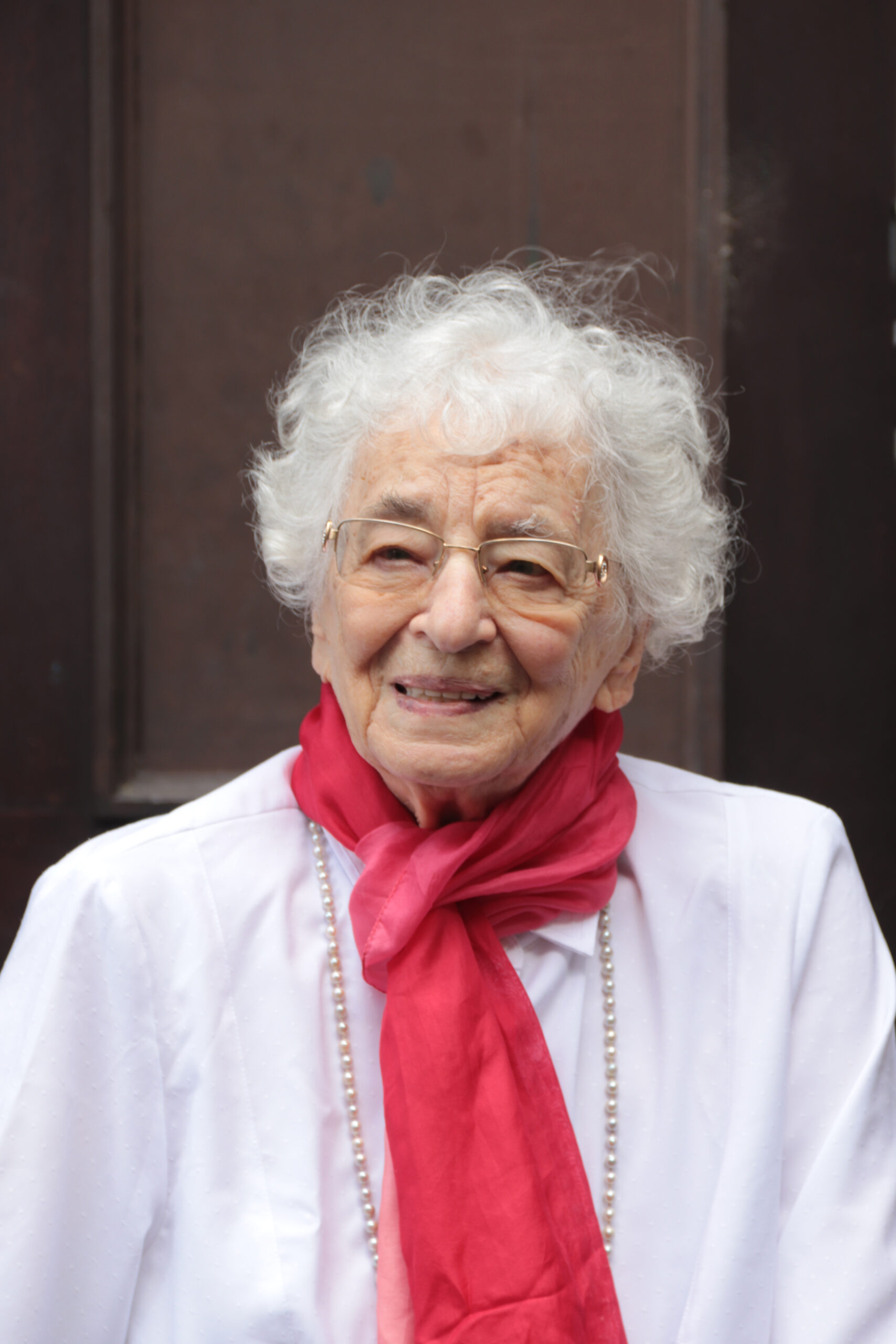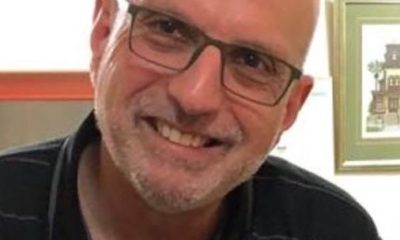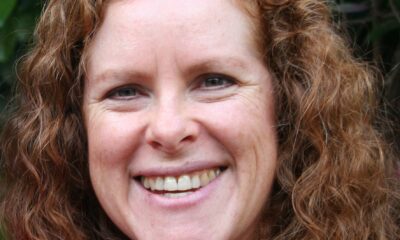
Featured Item

Honoured at 99: Ruth Weiss recalls fight against apartheid
Jewish writer, poet, and educator, Ruth Weiss (née Löwenthal), escaped Nazi Germany and grew up in South Africa, where her first-hand experience of fleeing persecution compelled her to speak out against oppression in South Africa.
She was a journalist and activist in the anti-apartheid movement, interviewing Nelson Mandela when he was on the run from the police, shortly before his incarceration. A short time later, she was forced to flee the country to avoid imprisonment. She never returned to live in South Africa, but remained an outspoken voice against hatred in any form.
Now, for the first time, she has been publicly recognised in South Africa for a lifetime of activism. On 28 April, President Cyril Ramaphosa bestowed the Order of the Companions of O.R. Tambo on Weiss because “her prolific writing shone the light on injustice in South Africa. She has been a source of knowledge for other journalists and activists”.
Weiss, who was born in 1924 and will turn 99 in July, told the SA Jewish Report that she felt “overwhelmed” on receiving the award. “It was so unexpected and yet so wonderful,” she says. “South Africa was my second home – I continued my involvement even after I’d been deprived of my South African citizenship and couldn’t return until the 1990s. It was great to feel welcome after that.”
Regarding the current state of South Africa, she says, “Nothing in life ever is as one had hoped. Equality and justice are now for all, but there’s the ever widening gap between rich and poor, the many issues of government, also the antisemitism, which is disappointing. Still, it’s no longer apartheid, which couldn’t be overcome within a few decades. The heritage is inevitably still a burden. Hope flickers on to fulfil Mandela’s hope that casting off the chains also means ensuring the freedom of everyone, a goal to be fought for until it’s reached.”
Weiss was born in Fürth, which adjoins Nuremburg. “The Nazis wanted to make it free of Jews as quickly as possible,” she says. “As a result, my father lost his job in 1933. Fortunately, he could immigrate to Johannesburg, where he had relatives. My mother, sister, and I followed in 1936. The years in Germany with the humiliation, fear, attacks on the way to school and one Shabbos to shul, marked me for good.”
So, when she came to South Africa, her eyes were wide open to the realities of apartheid. A self-taught journalist, she was business editor of Newscheck, before joining the Financial Mail. In 1966, she became Financial Mail’s bureau chief in then Salisbury (Harare) in what was then Rhodesia (Zimbabwe), but was declared persona non grata by the white regime because of her critical reporting and “sanction busting” stories.
“The pen, properly wielded, has its effect,” she says. “The injustices of the world can be objected to only by constantly publishing the truth and openly protesting against all racism and discrimination.
“During the Nazi era, Germans kept silent – that is neutral – in the face first of German Jews, then the mechanised massacre of European Jews. One must not turn away in the face of injustice, racism, antisemitism, Islamophobia, xenophobia, antifeminism, and homophobia, one has to speak out and fight fascism in all shapes and forms.”
Weiss moved to The Guardian in London, returning in the 1970s to Africa as business editor of the Times of Zambia, and as correspondent for the Zambian Financial Times. From Lusaka, she moved to Cologne as an editor in Voice of Germany’s Africa-English department, before turning freelance in London in 1978.
After covering the 1979 Lancaster House talks on Zimbabwe, she was invited to Zimbabwe to train economic journalists and was co-founder of the Southern African Economist. From 1987 to 1991, she worked on the staff of the Zimbabwe Institute of Southern Africa, which facilitated secret meetings of white and black South Africans ahead of official talks, which began in 1990 and led to the dismantling of apartheid. Starting in 1992, she wrote on the Isle of Wight for a decade. She moved to Germany in 2002, where she continued her research and writing of historical novels on anti-racism themes. She currently lives in Denmark.
Her novels explore the lives of Jews in different eras, and the lives of women in Africa. Her work includes the novel, My Sister Sara, which tells of a four-year-old, blonde, German war orphan adopted in 1948 by an Afrikaner parliamentarian who sympathises with the Nazis. The family falls in love with the child, but when her papers arrive from the orphanage six months later and the father discovers that Sara is Jewish, she’s rejected by them. The story was selected as compulsory matriculation reading in the German state of Baden-Württemberg in 2007.
“South Africa means a great deal to me,” says Weiss, who was involved in the Jewish community when she lived here. “I was a member of Habonim and later of Hashomer Hatzair. The leader of Hashomer Hatzair was Baruch Hirson. I later met him briefly before I left South Africa, and when he came out of prison we communicated, as I did with Ramon Eisenstein. I was always sorry that I lived in countries other than my South African friends, my itinerant life being what it was.”
Weiss came from an Orthodox family and first lived in Mayfair in Johannesburg, “then a poor-white suburb, where my father had a shop. I went to shul on the first Saturday to find myself, at age 11, the only female. There were few Jews left in Mayfair at that time, so the following Shabbat, I walked to the Wolmarans Synagogue, but it was a long walk through Fordsburg. My family by then had joined Etz Chaim, the German Jewish congregation in Hillbrow. When I was transferred for my final matric year to Parktown Girls High, my friends were Jewish girls whose economic status differed from my family’s, but not our beliefs.”
She recently completed a manuscript together with a friend “who had been unaware his mother was Jewish. The title we chose was Tikkun Olam. It was my Jewish background that made me feel it was important to fight against discrimination, humiliation, and antisemitism. That’s the reason I have written about 20 novels on Jewish history.”
Her hope for South Africa is that “all the issues can be resolved, and a new generation will fight for a better life for all. The young shouldn’t accept their inheritance, but question it and work out new ways of dealing with the huge problems facing this multi-people society. My advice to the young is always the same, ‘Don’t remain neutral – get involved and fight for equality’. There’s no ‘we and them’ only ‘us’, as we’re all human beings.”










